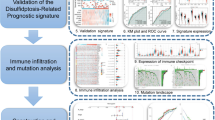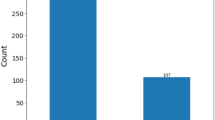Abstract
Objective
To establish a risk-stratification system for predicting the postoperative recurrence of esophageal squamous cell carcinoma, this study aimed to evaluate the prognostic value of clusters based on blood inflammation and coagulation markers and investigate their correlation with serum cytokines and genetic alteration.
Method
This single-center, retrospective cohort study enrolled 491 patients with esophageal cancer who underwent subtotal esophagectomy between 2004 and 2012. For cluster exploration, nonhierarchical cluster analysis and k-means were applied using serum C-reactive protein, albumin, fibrinogen, and platelet–lymphocyte ratio as variables. Then, multivariate survival analysis was conducted to investigate the association of clusters with recurrence-free survival. To characterize the clusters, serum interleukin-6, interleukin-8, and genetic alteration in primary tumors, the PleSSision-Rapid panel, which can evaluate 160 representative driver genes, was used.
Results
Patients were classified into clusters 1, 2, and 3, which included 24 (5%), 161 (33%), and 306 (62%) patients, respectively. Compared with cluster 3, cluster 1 or 2 had significantly worse recurrence-free survival. Based on the multivariable analysis using cluster, pStage, and age as covariates, cluster was an independent prognostic factor for recurrence-free survival (hazard ratio, 1.55; 95% confidence interval, 1.08–2.21; P = 0.02). The percentage of serum interleukin-6 and interleukin-8 levels was the highest in cluster 1, followed by clusters 2 and 3. In 23 patients with available genomic profiles, no significant difference in representative genomic alterations was observed.
Conclusions
Non-biased clustering using inflammation and coagulation markers identified the intense inflammatory subtype, which had an independent prognostic effect on recurrence-free survival.




Similar content being viewed by others
References
Takeuchi H, Fujii H, Ando N, Ozawa S, Saikawa Y, Suda K, et al. Validation study of radio-guided sentinel lymph node navigation in esophageal cancer. Ann Surg. 2009;249:757–63.
Akutsu Y, Kato K, Igaki H, Ito Y, Nozaki I, Daiko H, et al. The prevalence of overall and initial lymph node metastases in clinical T1N0 thoracic esophageal cancer: from the results of JCOG0502, a prospective multicenter study. Ann Surg. 2016;264:1009–15.
Tsuji T, Matsuda S, Takeuchi M, Kawakubo H, Kitagawa Y. Updates of perioperative multidisciplinary treatment for surgically resectable esophageal cancer. Jpn J Clin Oncol. 2023;53:645–52.
Ozawa S, Uchi Y, Ando T, Hayashi K, Aoki T. Essential updates 2020/2021: recent topics in surgery and perioperative therapy for esophageal cancer. Ann Gastroenterol Surg. 2023;7:346–57.
Tanaka Y, Yoshida K, Suetsugu T, Imai T, Matsuhashi N, Yamaguchi K. Recent advancements in esophageal cancer treatment in Japan. Ann Gastroenterol Surg. 2018;2:253–65.
Kitagawa Y, Ishihara R, Ishikawa H, Ito Y, Oyama T, Oyama T, et al. Esophageal cancer practice guidelines 2022 edited by the Japan esophageal society: part 1. Esophagus. 2023;20:343–72.
Kitagawa Y, Ishihara R, Ishikawa H, Ito Y, Oyama T, Oyama T, et al. Esophageal cancer practice guidelines 2022 edited by the Japan Esophageal Society: part 2. Esophagus. 2023;20:373–89.
Matsuda S, Takeuchi H, Fukuda K, Nakamura R, Takahashi T, Wada N, et al. Clinical significance of plasma fibrinogen level as a predictive marker for postoperative recurrence of esophageal squamous cell carcinoma in patients receiving neoadjuvant treatment. Dis Esophagus. 2014;27:654–61.
Matsuda S, Takeuchi H, Kawakubo H, Fukuda K, Nakamura R, Takahashi T, et al. Cumulative prognostic scores based on plasma fibrinogen and serum albumin levels in esophageal cancer patients treated with transthoracic esophagectomy: comparison with the Glasgow prognostic score. Ann Surg Oncol. 2015;22:302–10.
Matsuda S, Takeuchi H, Kawakubo H, Takemura R, Maeda Y, Hirata Y, et al. Validation study of fibrinogen and albumin score in esophageal cancer patients who underwent esophagectomy: multicenter prospective cohort study. Ann Surg Oncol. 2021;28:774–84.
Ishibashi Y, Tsujimoto H, Yaguchi Y, Kishi Y, Ueno H. Prognostic significance of systemic inflammatory markers in esophageal cancer: systematic review and meta-analysis. Ann Gastroenterol Surg. 2020;4:56–63.
Rice TW, Patil DT, Blackstone EH. 8th edition AJCC/UICC staging of cancers of the esophagus and esophagogastric junction: application to clinical practice. Ann Cardiothorac Surg. 2017;6:119–30.
Kaburagi T, Takeuchi H, Fujii H, Saikawa Y, Murakami K, Fukada J, et al. Initial experience of individualized chemoradiotherapy for superficial esophageal cancers based on the sentinel lymph node concept. Esophagus. 2012;9:147–52.
Matsuda S, Kawakubo H, Takeuchi H, Hayashi M, Mayanagi S, Takemura R, et al. Minimally invasive oesophagectomy with extended lymph node dissection and thoracic duct resection for early-stage oesophageal squamous cell carcinoma. Br J Surg. 2020;107:705–11.
Ando N, Kato H, Igaki H, Shinoda M, Ozawa S, Shimizu H, et al. A randomized trial comparing postoperative adjuvant chemotherapy with cisplatin and 5-fluorouracil versus preoperative chemotherapy for localized advanced squamous cell carcinoma of the thoracic esophagus (JCOG9907). Ann Surg Oncol. 2012;19:68–74.
Hara H, Tahara M, Daiko H, Kato K, Igaki H, Kadowaki S, et al. Phase II feasibility study of preoperative chemotherapy with docetaxel, cisplatin, and fluorouracil for esophageal squamous cell carcinoma. Cancer Sci. 2013;104:1455–60.
Mackie IJ, Kitchen S, Machin SJ, Lowe GD. Haemostasis and thrombosis task force of the british committee for standards in haematology. Guidelines on fibrinogen assays. Br J Haematol. 2003;121:396–404.
Okamura A, Takeuchi H, Matsuda S, Ogura M, Miyasho T, Nakamura R, et al. Factors affecting cytokine change after esophagectomy for esophageal cancer. Ann Surg Oncol. 2015;22:3130–5.
Kudo D, Goto T, Uchimido R, Hayakawa M, Yamakawa K, Abe T, et al. Coagulation phenotypes in sepsis and effects of recombinant human thrombomodulin: an analysis of three multicentre observational studies. Crit Care. 2021;25:114.
Tsumura K, Arai E, Tian Y, Shibuya A, Nishihara H, Yotani T, et al. Establishment of permutation for cancer risk estimation in the urothelium based on genome-wide DNA methylation analysis. Carcinogenesis. 2019;40:1308–19.
Saotome K, Chiyoda T, Aimono E, Nakamura K, Tanishima S, Nohara S, et al. Clinical implications of next-generation sequencing-based panel tests for malignant ovarian tumors. Cancer Med. 2020;9:7407–17.
Hoshino S, Matsuda S, Kawakubo H, Yamaguchi S, Nakamura K, Aimono E, et al. Elevation of the prognostic factor plasma fibrinogen reflects the immunosuppressive tumor microenvironment in esophageal squamous cell carcinoma. Ann Surg Oncol. 2022;29:6894–904.
Acknowledgements
This study was supported by the Japanese Association for Thoracic Surgery Award for Young Investigators and Takeda Science foundation.
Author information
Authors and Affiliations
Corresponding author
Ethics declarations
Conflict of interest
There are no other relationships or activities that could appear to have influenced the submitted work.
Additional information
Publisher's Note
Springer Nature remains neutral with regard to jurisdictional claims in published maps and institutional affiliations.
Supplementary Information
Below is the link to the electronic supplementary material.
Rights and permissions
Springer Nature or its licensor (e.g. a society or other partner) holds exclusive rights to this article under a publishing agreement with the author(s) or other rightsholder(s); author self-archiving of the accepted manuscript version of this article is solely governed by the terms of such publishing agreement and applicable law.
About this article
Cite this article
Matsuda, S., Hoshino, S., Goto, T. et al. Identifying intense inflammatory subtype of esophageal squamous cell carcinoma using clustering approach. Gen Thorac Cardiovasc Surg 72, 417–425 (2024). https://doi.org/10.1007/s11748-023-02006-6
Received:
Accepted:
Published:
Issue Date:
DOI: https://doi.org/10.1007/s11748-023-02006-6




